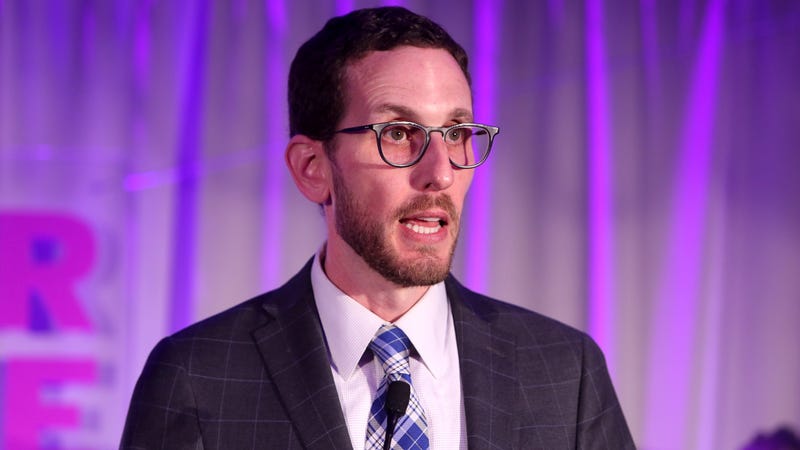 California State Senator Scott WienerPhoto: Getty
California State Senator Scott WienerPhoto: Getty
The feud between federal Republican officials and the architects of California’s recently passed (but as of yet unsigned) net neutrality bill intensified Friday, with State Senator Scott Wiener, the bill’s principal author, accusing the FCC of being bought and paid for by the telecom industry.
Wiener, a Democrat of San Francisco, returned fire in a statement after Ajit Pai, chairman of the Federal Communications Commission, referred to Wiener’s Senate Bill 822 as an “egregious” example of net neutrality proponents “pushing state governments to regulate the internet.”
“Last month, the California state legislature passed a radical, anti-consumer Internet regulation bill that would impose restrictions even more burdensome than those adopted by the FCC in 2015,” Pai said in a speech Friday at Maine Heritage Policy Center. “In a way, I can understand how they succumbed to the temptation to regulate,” he added. “After all, I suppose a broadband pipe might look to some like a plastic straw.”
Wiener countered after the speech, saying that, unlike the FCC, “California isn’t run by the big telecom and cable companies.”
“Pai can take whatever potshots at California he wants,” he said. “The reality is that California is the world’s innovation capital, and unlike the crony capitalism promoted by the Trump Administration, California understands exactly what it takes to foster an open innovation economy with a level playing field.”
Pai’s attack, delivered during a New England tour, echoed a number of talking points previously pushed by telecom industry lobbyists working to crush S.B. 822 on behalf of AT&T and other major internet service providers (ISPs). Some of his rhetoric mischaracterized central provisions of Wiener’s bill.
“Pai can take whatever potshots at California he wants.”
Pai alleged, for instance, that S.B. 822 “would prevent Californian consumers from buying many free-data plans,” suggesting that California legislators, such as Wiener, are attempting to “ban their constituents” from gaining access to so-called “zero-rating” incentives that allow consumers to stream music and video online without impacting ISP-enforced data limits.
“These plans allow consumers to stream video, music, and the like exempt from any data limits. They have proven enormously popular in the marketplace, especially among lower-income Americans,” Pai said. “But nanny-state California legislators apparently want to ban their constituents from having this choice. They have met the enemy, and it is free data.”
Wiener’s bill does not actually prohibit ISPs from offering these kinds of incentive, however.
S.B. 822 precludes ISPs from exclusively exempting from data limits apps and services that are owned by the ISPs themselves. In practice, this means that AT&T could not offer its customers free access to CNN—which AT&T owns—while charging them fees for access to all other sources of news and information.
The aim of targeting zero-rating schemes is to prevent AT&T, Verizon, and other major corporations from gaming the online marketplace by incentivizing solely the use of apps and services from which they directly profit. Without such protections, ISPs are financially motivated to limit the choices of economically strapped subscribers to websites and apps that enrich the ISPs.
In the case of news delivered online, such zero-rating schemes could result in ISPs pushing certain political views over those offered by competitive journalistic sources—a practice Republicans have expressed fierce opposition to in almost every other arena (see: Facebook).
Pai’s remarks, therefore, are not only factually inaccurate but give credence to Wiener’s claim that the FCC is acting in the best interest of telecom and cable companies.
Pai’s suggestion that the internet should be run by “engineers, entrepreneurs, and technologists, not lawyers, bureaucrats, and politicians,” is comically misplaced. As a former legal counsel at one of the nation’s largest ISPs, one cannot assume Pai is that naive. His suggestion that “engineers” and “technologists” are the driving force behind how Verizon structures its service plans is sorely disingenuous—and bordering on bullshit.
Characterizing the protections offered by S.B. 822 as a hindrance for “entrepreneurs,” as Pai suggests, is an accusation begging to be backed by at least some kind of proof. (He has never offered any.) When major broadband companies are given unfettered power to drive consumer spending toward their own investments, it is only logical that innovative startups with no ties to those companies will be the ones falling by the wayside.
As the birthplace of so many of the internet’s most successful startups, California isn’t ready to give up the advantage of being home to the next Google, Facebook, or Netflix. Certainly not when the only reward is to further enrich a handful of already extravagantly wealthy corporations with literal monopolies across vast swaths of the country.
“SB 822 is supported by a broad coalition of consumer groups, groups advocating for low income people, small and mid-size technology companies, labor unions, and President Obama’s FCC chairman, Tom Wheeler,” added Wiener. “I’ll take that support over Ajit Pai any day of the week.”